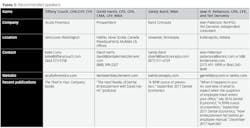The front-office 'skill' that could destroy your practice
Jean R. Patterson, CPA, CFE
Regardless of how skilled you are as a health-care professional, it is often your staff who keeps the patients coming back. The way patients are treated can be as important as the technical skills of the staff. But what about other front-office “skills,” ones that could destroy your practice if given the opportunity?
Because many dental offices have few front-office personnel, staff could be handling multiple functions. While this sounds like efficient use of time and reduction of payroll costs, it can be setting the stage for employee embezzlement. Embezzlement involves two stages: the theft act and the cover-up. If one person has the opportunity and skills to achieve both, the embezzlement can go undetected for months, or even years. In addition to the skills needed to perform his or her job functions, an embezzler needs persuasive skills to secure the trust of coworkers to successfully accomplish his or her goal.
It is said that all embezzlement involves the “permission” of management. This permission is granted not by commission—management does not actively participate in the act, but by omission, that is, by not taking the steps to prevent the act. Many steps can and should be taken to minimize the chance of becoming an embezzlement victim. Here are three.
Establish and follow thorough hiring procedures. This can significantly reduce the chance that an embezzler will join your team. The cost of the additional steps is relatively small compared to the potential of theft loss. For more information regarding the recommended steps and their cost, see “A $988 ounce of prevention,” in the September 2017 issue of Dental Economics.
Block the opportunity for theft by separating duties. Even if you take the appropriate steps to avoid hiring an embezzler, remember that people can change. Change in personal circumstances can turn an otherwise honest employee into an embezzler. Separation of duties reduces the chance that the same person has the ability to both steal and hide the activity.
For example, the person who collects the receipts should not be the person who deposits them and the person who deposits the receipts should not be the person who reconciles the bank accounts. Electronic transaction activity makes this vigilance even more critical. Because the “paper trail” is not as clear, it is essential that the practice owner knows what dental software reports of activity are available and reviews them regularly. One of my favorites is the adjustment report. Know what adjustments are being made and why. Earlier review of this report could have saved two practice owners I know a significant amount of money and angst.
This article does not go into the details of how the theft takes place, because explaining them in detail could unwittingly train an embezzler. This leads to the third step: educate yourself. Have a conversation with both your practice coach and accountant regarding the steps already in place, or those that should be instituted to protect your practice. If you belong to a study club or a state or local dental association, and the topic of fraud and fraud avoidance has not been discussed recently or ever, take steps to change that. There are many speakers who can present the details of how embezzlement takes place and explain how to avoid becoming a victim (table 1). Because they know the audience, they can discuss the specific techniques embezzlers use and present actual cases.
To ensure that the skills of your staff are the skills that will add to your practice and not take from it, you must have effective hiring practices and systems in place to block embezzlement, and become knowledgeable of your risk of fraud through education by and consultation with professionals.
Jean R. Patterson, CPA, CFE, is owner of J Patterson Consulting in Indianapolis, Indiana. She has worked with dentists for over 15 years. She welcomes your questions and comments. She can be reached at [email protected].



